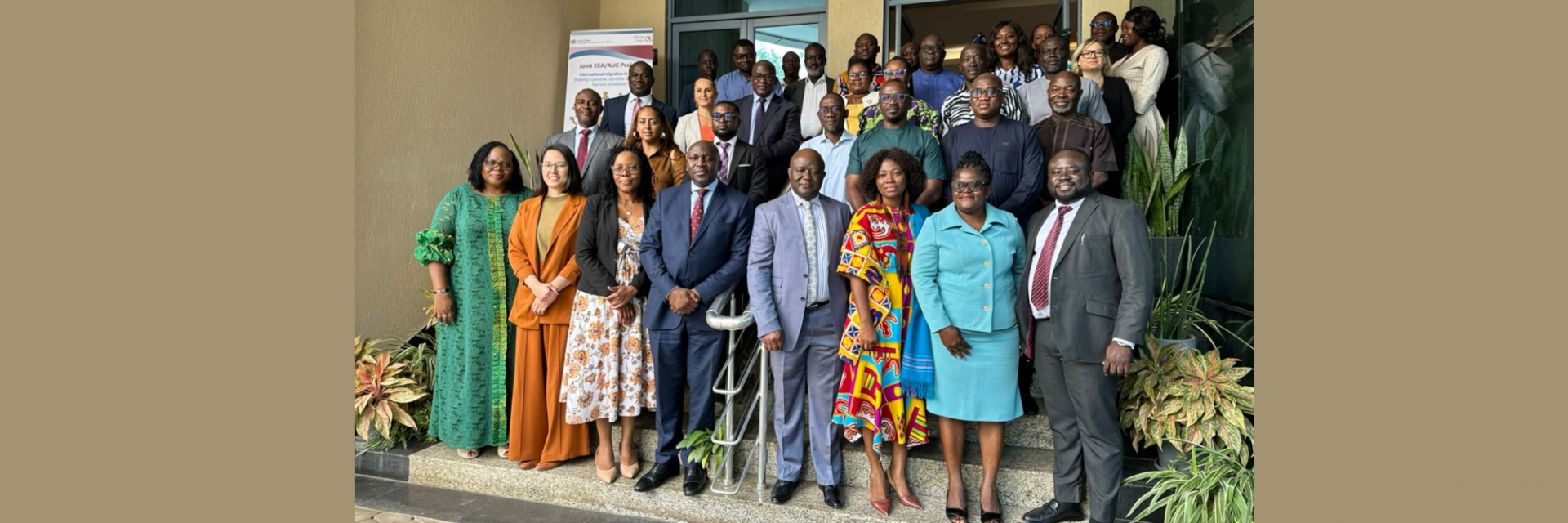Accra, Ghana, 18 September 2024 (ECA) – The Economic Commission for Africa (ECA) and the African Union Commission (AUC) convene a National Stakeholder Consultation Workshop to Review the study report on: “Enhancing free movement of persons and pathways for labour mobility and skills portability in Ghana”.
The study was undertaken as part of a joint ECA/AUC Project on “International Migration in Africa: Shaping a Positive Narrative and Removing Barriers to Mobility,” a transformative project, that aims to create a holistic framework for improving the free movement of persons and migration across Africa. The Ghana Workshop is the last of three case studies on the component on free movement of persons and pathways for labour mobility and skills portability; the other two being Kenya and Zambia.
Conceptually and practically the initiative is envisioned to address the underlying drivers of migration while tackling the significant challenges faced by African migrants. As a precondition for maximizing the benefits of migration for both migrant-sending and migrant-hosting nations, should work together to minimize the hardships experienced by mobile populations in Africa. The initiative also aims to foster constructive engagement with key stakeholders to enhance the discourse surrounding free movement of persons and migration in Africa.
“Recent data reveals that only 20% of African migration occurs outside the Global North and Middle East, with a significant 80% occurring within the continent. Despite this, the global discourse often misrepresents African migration as predominantly directed towards Europe, while countries in the Global North benefit from visa-free regimes in African nations, such as Ghana,” said Mr. Sabelo Mbokazi, Head of Labour, Employment & Migration of the African Union Commission, in his opening remarks,
He commended Ghana's commitment to national unity and cooperation in facilitating the movement of people, aligning with the African Union’s Agenda 2063, which advocates for integration, free movement, and trade. These principles are crucial to protect Africa from the resurgence of imperialism and neoliberalism.
The link between trade and migration is well-documented, demonstrating that a diaspora in host countries can yield significant economic benefits for their countries of origin. The establishment of the African Continental Free Trade Area (AfCFTA), adopted during the Kigali AU Summit in 2018, represents a historic effort to unite 55 African Union member States with a combined GDP of nearly $3 trillion. This Agreement establishes a legal framework for comprehensive economic integration, aimed at creating a unified African market that fosters the free movement of goods, services and people, and investment facilitation ultimately strengthening Africa's trading capacity.
“As participants during the workshop explore the vital connections between migration, human mobility, and trade, it is essential to recognize that Africa's diverse landscapes and economies are interconnected through the movement of people and goods. Ghana must harness intra-Africa mobility to unlock its potential and sustainable drive socio-economic development,” highlighted Mr. Mbokazi.
“The free movement of persons is essential for economic growth, innovation, and cultural exchange. As Ghana, Kenya, and Zambia engage in this project, our unified efforts to support the ratification and implementation of the African Union Protocol on Free Movement of Persons, the Right of Residence, and the Right of Establishment (AU Free Movement Protocol) will create significant opportunities. The link between this protocol and the African Continental Free Trade Area (AfCFTA) is crucial as we aim to establish accessible pathways for labour mobility and strengthen our regional economy,” said Vanessa Phala, International Labour Organization (ILO) Country Office Director for Nigeria, Ghana, Liberia, Sierra Leone and Liaison Office for ECOWAS.
Ms. Vanessa Phala highlighted the ongoing efforts of the International Labour Organization (ILO) in supporting labour migration governance and fair recruitment through the Free Movement of Persons and Migration in West Africa Project phase II (FMM II). Supported by the European Union and collaboratively implemented by the ILO, the International Organization for Migration (IOM), and the International Centre for Migration Policy Development (ICMPD), this project aims to maximize the development potential of free movement and migration in West Africa.
Over the next two days, participants will review the findings and discuss the broader goals of establishing Ghana’s role in promoting regular migration and skills portability, ultimately aiming for the ratification of the AU Free Movement Protocol. This workshop represents not just an academic exercise, but a vital opportunity for stakeholders to influence policy actions that can significantly improve labour mobility frameworks in Ghana and across the continent.
The recommendations validated during this workshop will serve as a foundation for advocacy, capacity-building, and stakeholder engagement, ensuring that Ghana is well-prepared to implement the AU Free Movement Protocol and reap the benefits of labour mobility under AfCFTA.
The workshop, organised by the United Nations Economic Commission for Africa (ECA) and the African Union Commission (AUC), brings together a diverse group of partners, stakeholders, and participants dedicated to advancing the free movement of people—an integral aspect of the African Union's vision for a prosperous and integrated continent.
Issued by:
Communications Section
Economic Commission for Africa
PO Box 3001
Addis Ababa
Ethiopia
Tel: +251 11 551 5826
E-mail: eca-info@un.org

